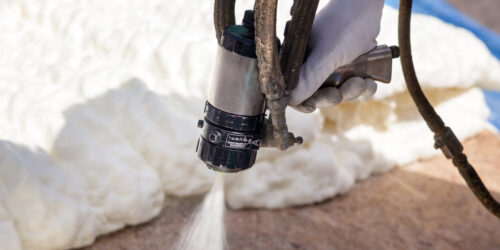Icynene Spray Foam Insulation: A Complete Guide
- Highest-performing heat insulation on the market
- More than 2xs more efficient than traditional insulation
- Lowers energy bills, protects against environmental noise and cuts carbon emissions
Icynene spray foam insulation is a name used interchangeably with the term spray foam, around the world. Delivering the most superior levels of insulation against heat loss, Icynene Europe are the market leading brand for spray foam insulation.
Providing the best protection against heat loss from your home, environmentally-friendly Icynene spray foam insulation is a superb investment which will pay for itself many times over.
Providing a robust barrier, Icynene spray foam has additional benefits beyond preventing heat loss, including sound-proofing, stopping harmful toxins from entering the home and more.
Lasting for over 30 years and installed by a professional spray foam installer, Icynene spray foam insulation is the ideal solution to make your home more energy efficient, reducing energy bills, carbon consumption and more.
Let’s explore the following frequently asked questions about Icynene spray foam insulation to learn more about what Icynene spray foam is, how it works and what the benefits are of installing Icynene spray foam insulation in your home.
Interested in spray foam? Use our quote comparison tool to find out how much you'd pay. It only takes a minute.
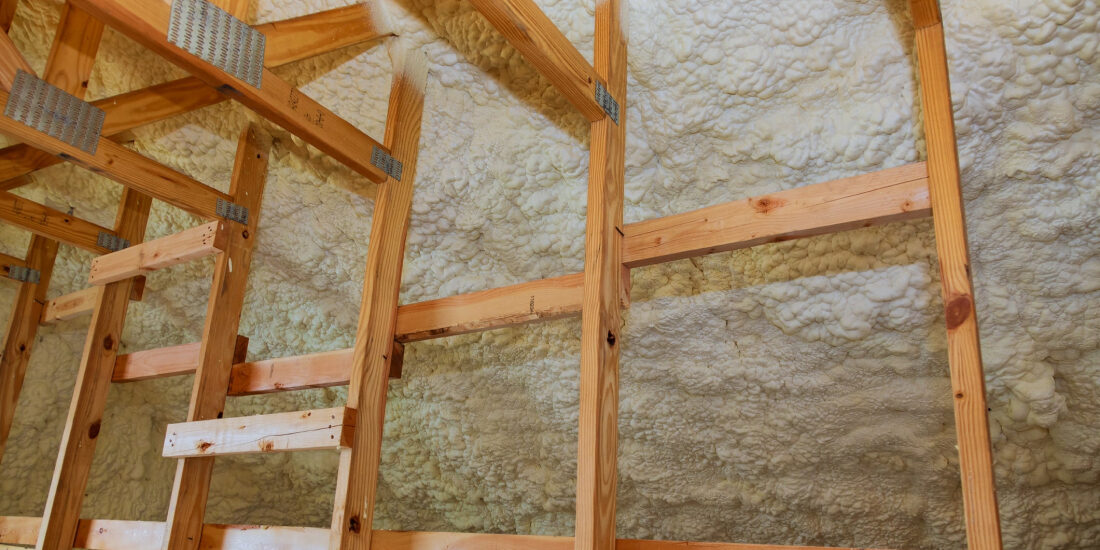
What's On This Page?
Click the links below and head straight to a specific section of the article.
What Is Icynene Spray Foam Insulation?
Icynene spray foam insulation is made from environmentally-friendly polyurethane, a powerful mixture of polymers and urethane bonds.
Spray foam insulation is a type of liquid plastic which expands and becomes hard as it cools. Invented back in 1937 by Otto Bayer, a German chemist, polyurethane is an extremely versatile material with robust qualities which makes it suitable for use in an enormous number of contemporary products.
Who are Icynene?
Doing what Hoover did for the vacuum cleaner, Icynene Europe is a global leading brand whose name has become synonymous with spray foam insulation.
Heat and weather-resistant, polyurethane is also able to prevent air passing through as well as sound, so it’s perfect for property insulation and a superb energy-saving solution.
Icynene Europe cornered the market back in 1986 and still holds monopoly for spray foam products. Both here in the UK and worldwide, you’ll find Icynene spray foam is the go-to brand across the industry, delivering superb performance and a quality product.
Types
There are two types of spray foam you can choose to install:
- Open cell spray foam
- Closed cell spray foam
Both are made from polyurethane but the main difference between the two is the type of barrier each forms.
Open cell spray foam: Choosing to install open cell spray foam will provide you with spray foam insulation which can block out sound as well as air. However, open cell spray foam is softer and less dense so your spray foam insulation installers will need to apply a thicker coating. More layers means a higher quantity of spray foam is used which will cost you more per unit.
Closed cell spray foam: On the other hand, if your spray foam installation installers recommend closed cell spray foam, you’ll benefit from a more rigid foam which has high efficiency.
However, closed cell spray foam is so dense it prevents moisture as well as air passing through meaning it can cause condensation if you do not have a good ventilation solution in place.
Which Is Best For Installation in My Home?
Your spray foam insulation installer will advise you on the best type of spray foam insulation to use in your home after carrying out a detailed survey of your property. Always use a trained, BBA-approved spray foam installer from a reputable spray foam insulation company.
For a full comparison of open cell and closed cell spray foam read our analysis: open cell vs closed cell spray foam insulation.
Why Choose Icynene Spray Foam Insulation?
Spray foam insulation can be installed in homes, businesses and industrial buildings. It’s robust qualities means spray foam insulation is suitable for almost all types of properties apart from:
- listed buildings
- properties with thatched roofs.
Versatile, long-lasting and able to fill any space, spray foam can be installed in the following places in the home:
Roofs
We don’t give much thought to our roofs unless they’re leaking but your roof is the place where the most energy waste can occur. Responsible for the loss of up to 25% of your heating, if left uninsulated, the roof is the most popular place to install spray foam insulation.
However, you need to ensure your roof is in good condition before installation can go ahead. Your spray foam insulation installer will check this for you using a structured survey assessment before any work is carried out.
Lofts
Similarly, lofts, traditionally insulated with lower quality blanket or loose-fill insulation, are now frequently updated with spray foam insulation.
More efficient, better quality and long-lasting, spray foam installed in your loft will save you large amounts of wasted heat which is lost, if insulation is poor, as it rises to the top of your property.
For a full overview of loft insulation, read our complete guide to loft insulation for all you need to know.
Cavity Walls and Floors
Able to expand, spray foam can fit easily into any space, including cavity walls and floors for a comprehensive insulation solution. With the capacity to keep your home warmer in winter and cooler in summer, without any further spend required, spray foam is an excellent investment.
According to the Royal Borough of Kensington and Chelsea, around 35% of heat is lost through walls and 15% through floors.
Spray foam is particularly ideal for tricky cavity walls and solid walls where other types of insulation can’t be used. If you choose to install open cell spray foam insulation in cavity walls, you’ll notice your walls have a little more give due to the softer consistency of soft cell foam – making banging your toe on the wall a little less painful!
Spray foam insulation can also be used in offices, schools, car parks, barns, storage containers and more.
Why Is Icynene Spray Foam Better Than Other Brands?
Spray foam installation is quick and easy when performed by professional spray foam installers. Spray foam is not something you can apply yourself, I’ll explain why in a sec.
Preliminary Survey
Your spray foam installer will carry out a comprehensive survey of your property before commencing the work. The survey covers:
- an assessment of the quality of the existing insulation in your home, calculated using the U-value method.
- an evaluation of the potential for condensation or any other issues to develop plus any solutions required to avoid them arising.
- the cost and timescale for the work.
The preliminary survey is essential because spray foam insulation is a permanent measure so it’s critical the right type and depth of foam is applied under the correct conditions. Before booking an installation with a spray insulation service make sure an initial survey is part of their installation process.
Is Icynene Spray Foam Safe?
If you agree to the work, you will need to ensure you do not need to return to the space during application and your installers have clear areas to operate in.
Your spray foam installer will apply the foam with a spray gun. The polyurethane foam is created inside the gun as the polymer resins and urethane bonds mix together in the nozzle. Your installer will have pre-set the spray to deliver the foam with the depth required for your property and this will be carefully monitored throughout installation.
Setting rapidly, the foam quickly becomes hard and fixed in place. You should be able to return to the space within two hours of application.
How Much Does Spray Foam Installation Cost?
The cost of your spray foam installation will depend on the size of your home, type of spray foam you have, the thickness of spray foam applied and the location/s where the foam will be applied.
Typically, you can expect to pay around £2500 for spray foam insulation to be installed. This would be the average cost for a 3 bed semi-detached house.
How does costs compare to traditional insulation? Let’s take a look.
Spray foam insulation vs traditional insulation
Type of insulation |
Cost per m2 |
Blanket Insulation |
£5 |
Loose-Fill Insulation |
£7.50 |
Sheet Insulation (loft conversions) |
£10 |
Spray Foam Insulation |
£20 – 55 depending on the depth of foam required for your property. |
Learn more about insulation costs and how they compare in our guide to insulation costs or get a tailored quote from us in minutes for a clear idea of how much you’ll pay.
Related articles
View all Insulation articles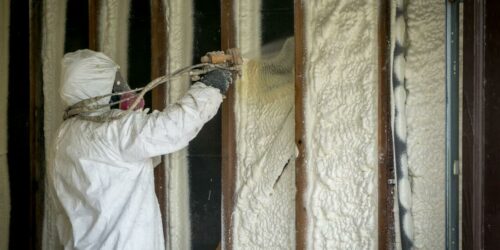
How Long Does Spray Foam Insulation Last?
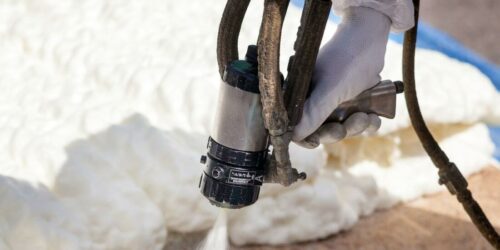
Can I Install DIY Spray Foam Insulation Myself?
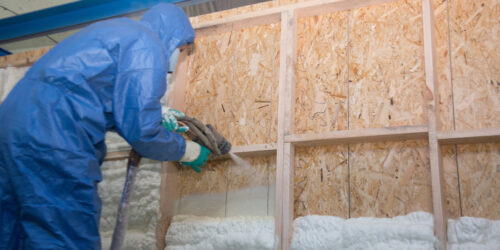
Six Benefits of Spray Foam Insulation
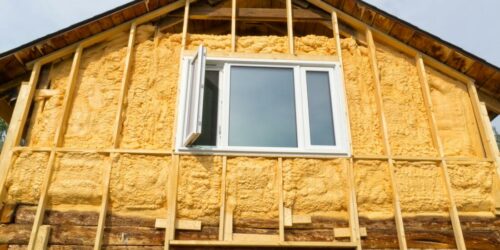
Is My Property Suitable for Spray-On Insulation Foam?
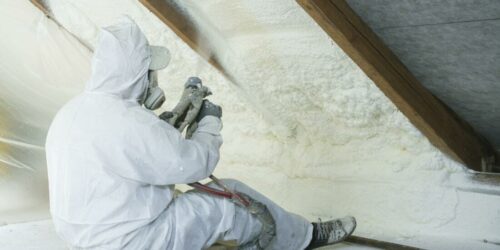
Why Consider Spray Foam Insulation in Roofs?
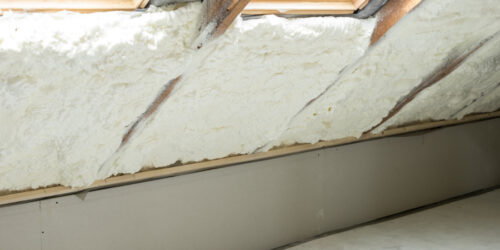
Spray Foam Insulation Installers: What to Expect
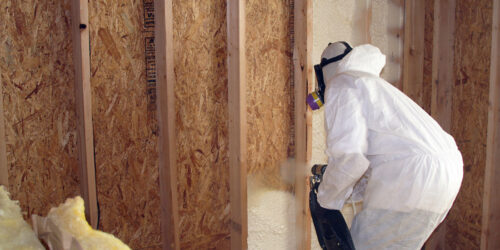
Open Cell vs Closed Cell Spray Foam Insulation: What’s The Difference?
